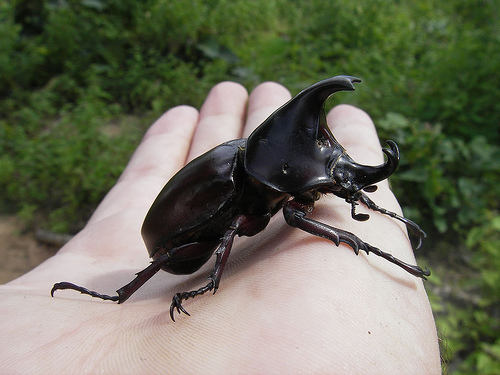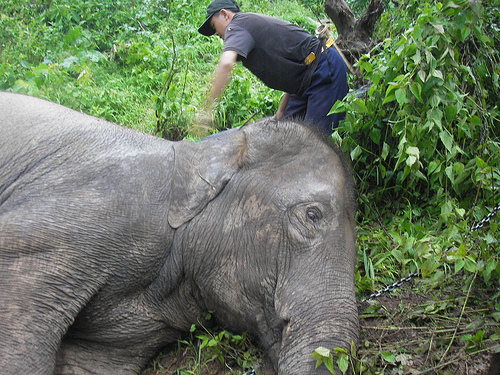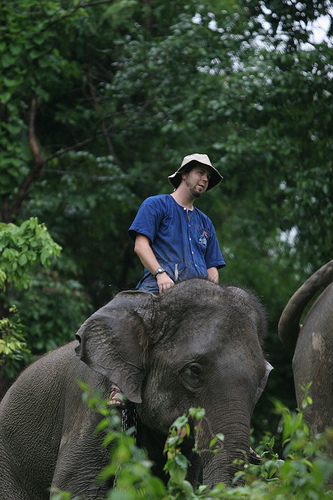chiangmai
A Small Blog World
Last week in Chiang Mai, we took a couple of days of cooking classes and met a couple from the Bay Area named Nadav and Anya. Through some chit-chat we discovered that they have been on a journey similar to ours, including a few days on the Thai island of Phi Phi.
After the class was over, we got an email from Nadav and this is what it said:
So nice to meet you today...As it turns out, we've been reading your blog for about a week already. We were looking for information on Phi Phi, did a google blogsearch and found you! Thanks to your post, we decided to go. Thanks for the recommendation! Best wishes, and happy trails How cool! I'm excited that we were able to point these guys to something we enjoyed, but also I think it is great that we can use this little site to encourage people to visit a beautiful place that really needs more help (in the form of tourist dollars) recovering from the tsunami.
Should We Be Riding Elephants in Thailand?
Among travelers to
Should we be riding around on elephants? Isn’t the elephant being exploited? Is it inhumane for elephants to be used for tourism?
Of course we all wish the elephants could live in the wild and be undisturbed by humans. However, for about the last 4500 years, elephants have been captured, domesticated and used for transportation, labor and even warfare. For thousands of years, the elephant has been living with and around humans and over that time we humans have learned the requirements for ensuring that the relationship is stable and productive. One of the outgrowths of these years of domestication is the role of mahout, which is the elephant’s trainer- an essential and vital role for the elephant and human. For the last three days, I learned a little about being a mahout and his relationship with the elephant. These are mahouts with their elephants at the Thai Elephant Conservation Center:

The mahout has a unique relationship with the elephant- one that can last decades. When an elephant is born into domestication, it is assigned a mahout who will be responsible for the elephant for the mahout’s whole life. In fact, some elephants outlive their mahouts (elephants can live 80+ years) and the elephant is then often passed down to the mahout’s son. As you might imagine, a strong bond develops between the mahout and the elephant that goes beyond trainer and animal. When I asked about the nature of the relationship, it was described as companionship. The elephant seeks the company of the mahout and feels at home with the mahout on his back- they are a lifelong team.
As I experienced, the relationship is not one purely of hugs and treats. As dog owners know, a dog seeks to be the alpha (dominant) dog in the family and if it perceives that it has reached this role, it will become less trainable and try to dominate the humans. The same basic idea is true with the elephants. The mahout must maintain a relationship with the elephant that ensures that the elephant is not dominant, but submissive to the mahout. A dominant elephant can be lethal.
How do you dominate an elephant? Unfortunately, is partially through pain, or at least the threat of pain. Elephants are incredible heavy, strong, willful and tough animals. In order for the mahout to be able to train the elephant, he must have some way to send positive and negative messages. Along with voice commands and touching, the tool of choice for mahouts is an ominous looking pointed metal hook called an ankus. This hook is used to guide the elephant and to correct poor behavior. Though it seems a bit barbaric to the layperson, this evolved over many years and ensures that the elephant and mahout have mutual respect.

For hundreds of years in
Today, many elephants have found a new home by working in the eco-tourism industry. Elephants that are sufficiently trained and mild-mannered can now be supported through tourism. By offering rides through the jungle, elephant shows and elephant education, the mahouts and their elephants can support themselves without the logging industry. For many elephants, working conditions are greatly improved and as more tourists come to
The
So, to return to the original questions…
Should we be riding around on these animals? Isn’t the elephant being exploited? Is it inhumane for elephants to be used for tourism?
Of course, this is a personal decision. I realize that many readers will not ride an elephant on principle alone. However, I hope that I’ve provided information here that illustrates a bit of the complex circumstances of the elephants in
3 Day Mahout Training, Thai Elephant Conservation Center
I return from 3 days of learning about elephant training more of an elephant lover and with more mixed feelings about the life of the domestic elephant.
The Thai Elephant Conservation Center offers a multi-day mahout training course that enables a tourist to live at the center for 3 days to learn about elephants and elephant training, their relationship with their trainer (the mahout) and general elephant/mahout life. The course includes accommodation for 2 nights, 5 meals and all instruction for about $125. Below is one day in the mahout training program.











The experience at the
Though they are very well cared-for at the center, their size and potential for destruction requires that they lead a life in bondage- chained to a tree or the floor consistenly. Being domesticated from birth, this lifestyle is a reality to the elephant in the way that a dog is kept in a kennel or a rabbit in a cage. I left with the feeling that the elephants at the center are quite happy, but there are many in the country (and world) that are not so happy and it pains me to think of the life they lead. Thankfully, organizations like the
See Also: Should We Be Riding Around On Elephants in Thailand?
A Royal Spectacle
Thailand is currently in the midst of an event that is somewhat incomprehensible to Americans like us. The Thai King Bhumibol Adulyadej is celebrating 60 years on the throne (making him the world's longest serving monarch) and this event has the Thai people entranced. A couple of nights ago, the King welcomed royalty from over 25 countries to his palace for a gala and it seemed that every Thai TV in the country tuned in for the event. As we learned the next day, it was extremely rare for the people to see their beloved King, even on TV. As one restaurant manager explained to us "everyone is just so happy for the King". The event even took precedence over the World Cup. More on BBC News
The reason I say it is incomprehensible to us is that we have never known an enduring personal symbol of our country. Seeing the incredible love, dedication and almost religious devotion to the King, it makes us realize how important his role is for national unity and stability. He is, to an astounding degree, the symbol of Thai success, morality and stability. It makes us wonder what it would be like to have American royalty. Would the country be so divided? Would the American equivalent of the Thai King be a positive influence, or a joke?
One Day: Phuket to Chiang Mai, Thailand
6am - Awoke with a wake up call from reception. Lee regrets not brushing teeth after pre-bed Oreo snack. Shower and finish packing.
6:35am - Walk to free (or included) breakfast. Yoghurt, pineapple, meusli, toast for Lee; rice and pineapple for Sachi.
6:50am - Pay final bill at checkout. An extra night plus 2 lunches and a couple of minibar indiscretions = about US$100. Karon Beach Resort was a bit of a splurge.
6:55am - Go outside assuming we would see taxis or car-like tuk-tuks. None are found, feel at-risk for missing flight. Go back to hotel reception, she calls their driver- he cannot come for 20 mins- not enough time (he says) to make our flight. Bell boy takes off on motorcycle to track down taxi (earns nice tip).
7:03am - Aging Alpha Romeo taxi appears. We climb in and find that we could have saved money by using the hotel minivan. Feel regret for not accepting the hotel's offer yesterday.
7:52am - Arrive at airport, check in, buy Rough Guide to SE Asia.
8:25am - Board bus to plane and wait for 20 minutes on stationary bus. Travel approximately 150 meters to plane. Laugh with other passengers about the ridiculously short bus trip.
8:50am - Board plane to Bangkok.
10:28am - Arrive Bagkok, recheck in for Air Asia flight to Chiang Mai. Find infinite amusement is witnessing a women scurry rapidly from her family to ensure a place in line in front of us- for a flight leaving in 2 hours.
11:22am - while waiting for flight, try to connect to airport wireless internet. Costs US$7 per hour. No way - too much. Domestic terminal lunch options are: Burger King, Smoking Pub, Black Canyon Coffee and Dairy Queen. We have Whoppers.
1:05pm - Discover that flight is delayed 1 hour. Meet Sonja, who just graduated high school and has lived in Chang Mai for 5 years.
2:10pm - Board flight to Chang Mai on low-cost Air Asia (US$38PP). Feel pressure to compete for unassigned seats. Share our row with Sonja, who is 1/2 Iranian and 1/2 white American and has lived in Atlanta, Swaziland, Cambodia and Thailand. Really cool to talk to Sonja. She recommends the Amora Hotel and even has a business card.
3:55pm Arrive at aging but nice Amora hotel, reserve 5 nights for about US$40 per night, breakfast included.. Great location. Relax and plan.
5:05pm - Walk blindly into Chiang Mai streets, quickly discover a neighborhood full of uninteresting house fixtures. Find better street, eat at Noi's Kitchen, buy book on Pol Pot. Return to hotel.
6:09pm - Lee is awed to see this text scroll across the TV screen on BBC World News: "Microsoft blogger who made the software giant more human is leaving to join a technology startup". Scoble made the BBC World ticker? Wow.
7:12pm - Sachi dissects our toiletries bag and finds 31 miniature toothpaste bottles from Japanese hotels (pictured above). We realize a great travel tip: If you have more than one of something, use it up completely before opening the next. Otherwise you carry mutiples forever (like both of Lee's half-full mini shaving cream bottles).
8:05pm - Head out to the THC Rooftop Bar, cool hippy atomsphere and uncool unhippy staff- no smiles at all. Have dinner for 3 dollars (panang curry beef, oyster sauce beef and pineapple shake).
9:55pm - Return to hotel to settle in watching US play Czechs in world cup, feeling good about Chaing Mai.
11:59pm - Feel disappointment for USA's poor showing. Sad to see so much ball possession, so little goal scoring.






Recent comments
2 years 32 weeks ago
2 years 37 weeks ago
2 years 37 weeks ago
2 years 42 weeks ago
2 years 49 weeks ago
3 years 6 days ago
3 years 8 weeks ago
3 years 14 weeks ago
3 years 14 weeks ago
3 years 17 weeks ago